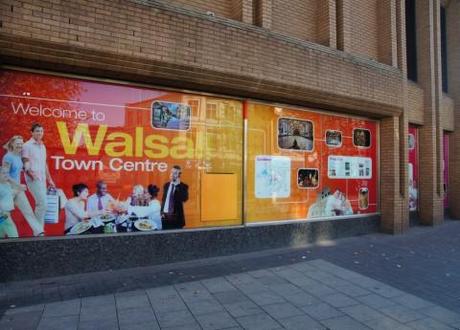
Walsall Town Centre. Photo credit: Tim Ellis, http://www.flickr.com/photos/tim_ellis/6270563752/
Right now, more than 90 potential business units sit unused in Walsall town center.
The empty and disused units are not a new prospect here in Walsall, nor are the accusations of high business rates and rents, nor the apparent apathy that afflicts many of our leaders. What is new is the speed at which all of these factors are hastening Walsall’s decline, as the global financial crisis continues unabated; with each visit to the town centre, more and more symptoms of that rot become evident. Another favorite shop or service has gone or been replaced by a cheaper chain; the pairs and trios of alcoholics and drug users wandering the streets have multiplied into groups of six or more; the numbers of young adults touring agencies and businesses looking for work has risen many-fold. All of these combine to make the town seem dirty, desolate, and to many vulnerable people, it can be terrifying.
As someone who was born and bred in Walsall, who has lived and worked here all of my life, this analysis is painful. The global crisis is a big factor in my town’s decline, but the lack of a pro-active response to its worsening condition is woeful. Blame for that must rest at the feet of our local, regional and national leaders.
We have been in the midst of recession and economic shrink for a long time now, yet still politicians at all levels are more intent on proving the opposition’s position wrong than proving their own to be correct. The bickering and sniping so apparant on Prime Minister’s Questions, Question Time, Daily Politics, as well as in town halls and council chambers across the country is the exact thing that is wrong with British politics and it has been this way for decades. Would I still be in a job if I cheered or booed every decision at a Board meeting? Probabaly not. Would I get away with answering a question with a totaly unrelated answer? Definitely not. If I decided not to attend meetings that bore me, would that be acceptable? Easily a no. But British politicians get away with that and more.
Multi-party politics is a fundamentally great idea, offering a democracy where everyone can be represented and open debates allow voters to analyze both sides of each argument and decide which they agree with. The coalition government currently in office is the greatest testament to this need for representation and, crucially, the need to work together when there is not an agreed consensus or majority of opinion between those represented. As we approach what could potentially be the darkest period yet of this recession, perhaps there is a lesson here for all our politicians about working together for the greater good.
Neither the Conservatives nor the Liberal Democrats really want to share power, but the alternative was a drawn out, messy saga with the potential to cause even greater damage. So they swallowed their pride, and joined forces. Now take the current situation and note the similarities and the differences. Labour do not want to agree with anything that the coallition comes up with, but the alternative is to fight, snipe and claw at everything that is said – creating a drawn out, messay saga with the potential to cause even greater damage. So they fight, snipe and claw at everything that is said.
What this country needs at the moment is unity, clarity and confidence. How much public kudos would Ed Milliband earn if he refused to criticize certain policies that are currently critical to all of us, such as dealing with unemployment and the national debt, and focused on supporting the government on these issues? There would be many hardline Labour followers who would see it as betrayal, but perhaps it might coax others into realising that the quickest way out of this mess is to pull together and act on behalf of Britain, not the party. And perhaps it might be a model adopted by local councils, which are beset by smaller versions of the same games.

